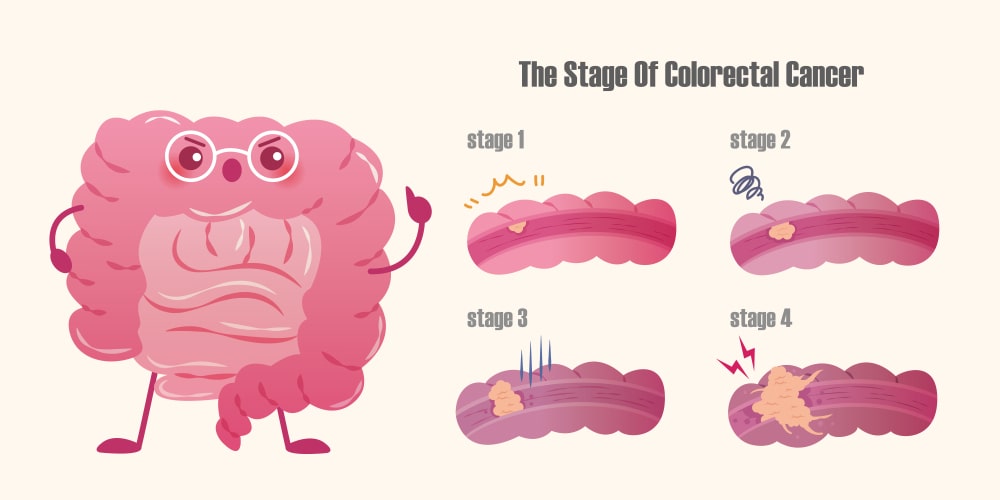

Pioneer Woman Colon Cancer Stage 4: A Journey Of Strength And Resilience
The story of Pioneer Woman, Ree Drummond, and her battle with colon cancer stage 4 is one that resonates with many. Her journey is not just a testament to her strength but also a beacon of hope for those facing similar challenges. As we delve into this article, we will explore her experiences, the impact of colon cancer, and the importance of early detection and support systems. Understanding the struggles and triumphs of individuals like Ree can inspire and educate us all about this serious health issue.
Colon cancer is a significant health concern, particularly for those diagnosed at advanced stages. Stage 4 colon cancer indicates that the cancer has spread to distant organs, making treatment more complex. This article will provide an in-depth overview of Ree Drummond's personal battle with this disease, the medical aspects of colon cancer, and the support systems that can help individuals and families cope with such diagnoses.
Through her candid sharing of experiences, Ree has raised awareness about colon cancer, its symptoms, and the importance of regular screenings. By following her journey, we can learn valuable lessons about resilience, community support, and the ongoing fight against cancer.
Table of Contents
- Biography of Ree Drummond
- Overview of Colon Cancer
- Understanding Stage 4 Colon Cancer
- Ree Drummond's Battle with Colon Cancer
- Importance of Early Screening
- Support Systems for Cancer Patients
- Resources for Patients and Families
- Conclusion
Biography of Ree Drummond
| Name | Ree Drummond |
|---|---|
| Date of Birth | January 6, 1969 |
| Profession | Bloggers, Author, and TV Personality |
| Known For | The Pioneer Woman |
Ree Drummond, affectionately known as “The Pioneer Woman,” is a beloved figure in the culinary world. She gained fame through her blog, where she shares delicious recipes and insights into her life on a ranch in Oklahoma. Ree's warmth and authenticity have endeared her to millions of fans, making her a household name.
Overview of Colon Cancer
Colon cancer, also known as colorectal cancer, begins in the large intestine (colon) or rectum. It is one of the most common types of cancer diagnosed in both men and women. Understanding its symptoms, risk factors, and treatment options is crucial for prevention and early detection.
Symptoms of Colon Cancer
- Changes in bowel habits (diarrhea or constipation)
- Rectal bleeding or blood in stool
- Unexplained weight loss
- Persistent abdominal discomfort (cramps, gas, or pain)
- Fatigue
Risk Factors
- Age (risk increases after 50)
- Family history of colon cancer
- Certain genetic syndromes (e.g., Lynch syndrome)
- Low-fiber, high-fat diet
- Obesity and lack of physical activity
Understanding Stage 4 Colon Cancer
Stage 4 colon cancer is the most advanced stage of the disease. At this stage, the cancer has metastasized, meaning it has spread to other parts of the body, such as the liver or lungs. Understanding this stage is vital for patients and their families as it affects treatment options and prognosis.
Diagnosis and Treatment Options
Diagnosis of stage 4 colon cancer typically involves imaging tests, biopsies, and blood tests. Treatment often includes a combination of surgery, chemotherapy, and targeted therapies. Palliative care is also essential to manage symptoms and improve the quality of life.
Ree Drummond's Battle with Colon Cancer
Ree Drummond’s experience with colon cancer stage 4 is a powerful narrative of resilience. She has openly shared her journey, including her diagnosis, treatment, and the emotional toll it took on her and her family. Ree emphasizes the importance of early detection and encourages her followers to get screened regularly.
Importance of Early Screening
Early screening is one of the most effective ways to detect colon cancer before it progresses to advanced stages. Screening methods include colonoscopies, which can identify precancerous polyps, and other tests that can help detect the disease in its early stages.
Guidelines for Screening
- Start screening at age 45 for average-risk individuals.
- Individuals with a family history of colon cancer should start earlier.
- Discuss screening options with healthcare providers.
Support Systems for Cancer Patients
Coping with a cancer diagnosis can be overwhelming, making support systems essential. Friends, family, and support groups can provide emotional and practical assistance during treatment. Ree Drummond has emphasized the importance of having a strong support network throughout her journey.
Resources for Patients and Families
Numerous resources are available for patients and families affected by colon cancer. Organizations like the American Cancer Society and the Colorectal Cancer Alliance offer valuable information, support groups, and financial assistance for those in need.
Conclusion
Ree Drummond's journey with colon cancer stage 4 is a testament to the strength of the human spirit. Through her story, we learn the importance of early detection, the value of support systems, and the impact of sharing experiences. If you or someone you know is facing a similar situation, remember that you are not alone. Reach out for support, get screened, and stay informed about your health.
We invite you to leave your thoughts in the comments, share this article with others, and explore more resources on our site to stay informed about colon cancer and its impact.
Thank you for reading, and we hope to see you back here soon for more insightful discussions and resources.
What Ethnicity Is Tulsi Gabbard's Husband?
Father On Everybody Hates Chris: A Comprehensive Analysis
5StarsStocks.com: The Best Stocks To Invest In


:max_bytes(150000):strip_icc()/stage-4-cancer-5092070_color-b41add690efd427294f126c16723372c.jpg)